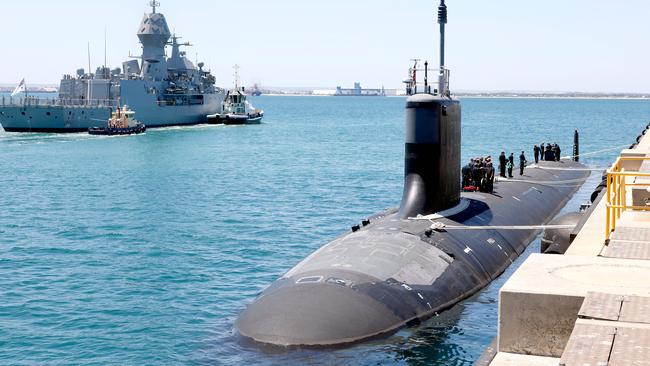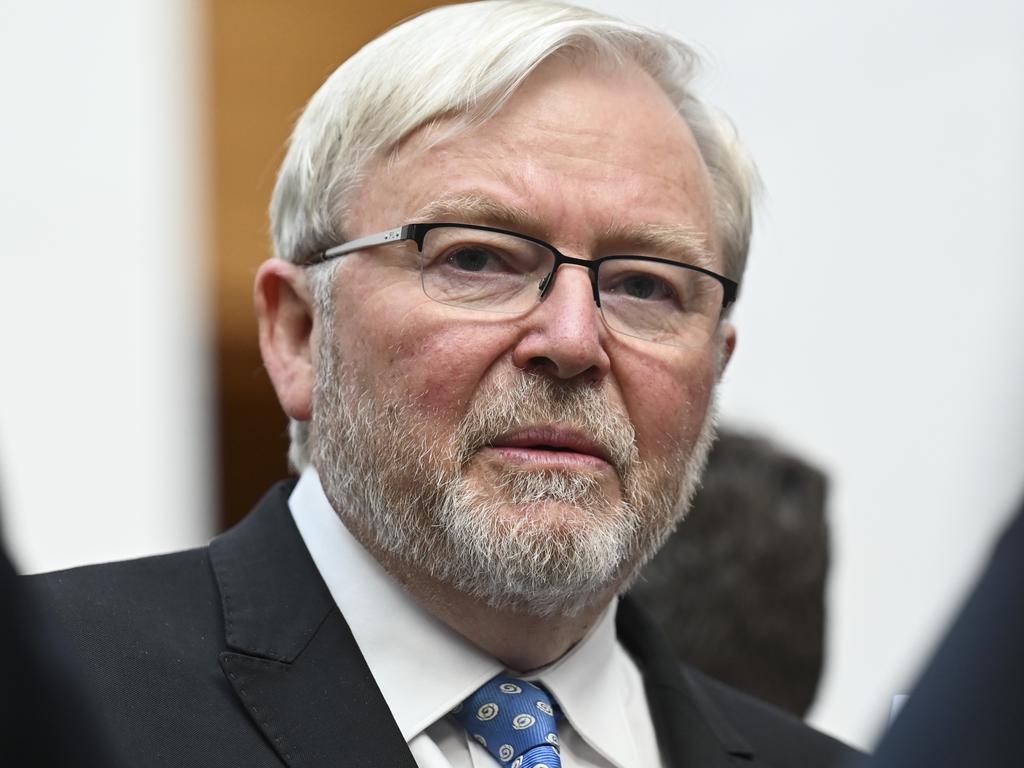Will Donald Trump sink AUKUS if he wins?
We need to start wooing Donald Trump now in case he gets back in the White House.

Much more is at stake than bonhomie about alliance relations. If Trump trashes the AUKUS partnership on the false grounds that it involves America “losing” and Australia unfairly “winning” an alliance advantage, then Australia emerges with no credible defence posture in a very risky world.
Beyond submarines, Australia needs the US to stay engaged in the security of the Indo-Pacific. The worst possible Trump nightmare is that the president “cuts a deal” with Xi Jinping, leaving Taiwan, Japan, South Korea and Australia most exposed to China’s ambition for regional dominance.

Since Curtin and Menzies, Australian governments have put immense effort into shaping American security policy in the Indo-Pacific. The ANZUS alliance and its AUKUS offspring have been successful because Australia invests so much effort in understanding Washington.
There is a reason the Australian brand is so strong and so popular in Washington DC. Its not because we are brilliant but rather that we build personal relationships and do our best to bring genuine military, intelligence and diplomatic capability to the table.
During our Afghanistan deployment, an American admiral put it to me that he liked the Aussies because they didn’t sit on their packs inside the ISAF headquarters at Kabul airport. They got out beyond the wire, patrolled, talked to the locals. We would be there with the Americans in a fire fight.
When we were losing soldiers on patrol, there were times I wished our forces had sat on their packs a bit more, but Afghanistan was an alliance operation for Australia. The kind of investment that ultimately convinces an American president that Australia can be trusted to have nuclear submarines.
On defence, Australia is in a unique position with the US. Do we deserve that place? Americans might like us a little less if they knew us better, but we need to do everything we can to sustain that position of trust.
Enter Donald Trump, who has for decades held a view that America’s allies free-ride on the security provided by US military power. Most if not all postwar American presidents held that view but Trump combines it with an impulsive, unpredictable personality and a lack of deep engagement in the details of national security.
Recall Trump’s unsuccessful attempt to negotiate nuclear disarmament with North Korea’s “little rocket man”, Kim Jong-un. Before the June 2018 summit with Kim, Trump told a media conference: “I don’t think I have to prepare very much. It’s about attitude. It’s about willingness to get things done.”
At the summit Trump played Kim a video in the style of an action movie trailer developed by White House staff: “Destiny pictures presents: two men, two leaders, one destiny … Featuring President Donald Trump and Chairman Kim Jong-un in a meeting to remake history.”
History was not remade. Kim baulked when he realised that the US was genuine in wanting him to disarm his nuclear weapons.

Trump scared the allies. He unilaterally cancelled a major South Korean-US military exercise and complained about the cost of keeping forces in Guam and Okinawa. But while the summits came to nothing, he was the first serving president to meet the North Korean Supreme Leader.
By contrast, Obama’s policy of strategic patience with the North did nothing to slow their nuclear weapons program, and the Biden administration has run dead on North Korea with seemingly no ideas on what to do next.
On Indo-Pacific security, Trump’s first term played out quite well. The administration shaped a tough policy pushing back against China’s aggression, cyber spying and intellectual property theft. The relationship with Japan strengthened. Despite all Trump’s talk about free-riding allies, the US did not reduce its military presence.
Trump’s famously bruising phone call with Malcolm Turnbull in January 2017, over whether the president would keep an Obama commitment to resettle in the US individuals detained on Manus Island and Nauru, has been misinterpreted.
Trump was loudly unhappy but honoured the deal. Turnbull won a difficult outcome. I doubt that Trump would have made that concession to any other US ally. He probably would not have agreed to the same Australian request later in his term.
Tony Schwartz, who ghost-wrote The Art of the Deal, says of Trump, “He’d like people when they were helpful, and turn on them when they weren’t. It wasn’t personal. He’s a transactional man – it was all about what you could do for him.”
How does Anthony Albanese build a relationship with Donald Trump? The two could not be less alike in ideology, political orientation, background and personality. That’s beside the point. Both leaders have enough interests at stake to make the relationship work.
Albanese should read Tobias Harris’s excellent autobiography of former Japanese prime minister Shinzo Abe, The Iconoclast, which details how Abe wooed Trump with multiple meetings, phone calls (16 in 2017 alone), endless golf games and the gift of a gold-coloured golf driver.
Abe copped political flack in Japan for appearing to flatter Trump, but his engagement worked. The Trump administration strengthened the “special relationship” with Japan, adopted Abe’s “free and open Indo-Pacific” as a strategic organising concept and enabled Japan to play a stronger role on trade co-operation.
Albanese will need to put as much effort into Trump management as into engaging with Xi. His first move should be to meet Trump before the presidential election in November.
Albanese should convene an AUKUS management team comprising Scott Morrison, Joe Hockey (who famously golfed with Trump), Kevin Rudd and Stephen Smith, now High Commissioner in the UK.
This is an unashamedly bipartisan approach which runs counter to Labor’s worst tribal instincts, but Morrison and Hockey will be critical factors in bringing Trump and the Republicans into alignment on AUKUS.
Albanese should go to Trump’s Florida residence at Mar-a-Lago and hand over a gold-plated model of the future AUKUS submarine. Richard Marles should be there too, along with his golf clubs, and the both of them should putt for their country. The opposition needs to cut Albanese some slack on travel, gifts and golf and see the bigger picture.
Just as Shinzo Abe did, Marles should be pitching for a new strategic dialogue with whomever Trump picks as his vice-presidential running mate.

Rudd will already be relentlessly working Republican contacts in DC. That’s essential because it will be Trump’s future national security team that shapes the president on AUKUS, nuclear submarines and future technology.
Albanese needs to make sure that none of his frontbench or backbench colleagues makes smug remarks about Trump on social media. The Donald is remarkably thin-skinned and remembers those slights.
As important as these steps are, by far the most important thing Albanese needs to do is to start investing in Australia’s current defence capability.
Trump is no fool. He will recognise our government’s fraudulent practice of talking up future investment in AUKUS while starving today’s ADF.
Our strategic outlook means there is no alternative to lifting defence spending. Notwithstanding the strength of brand Australia in Washington DC, Trump is fundamentally correct that we have coasted on America’s security coat-tails by spending less than 2 per cent of GDP on defence for decades. Only a foolish Australian government would believe that amount covers our real security needs.
Defence funding needs to be lifted quickly through a combination of investment into Australian defence industrial capability and purchases of existing technology from current American production lines.
Trump will appreciate the investment, but don’t think this is flattery, this is just what Australia needs to do for its own security.
Albanese should find a way to send a navy ship to the Red Sea and make it clear that by doing so a US navy vessel can be freed for other tasks.
And Albanese should reverse one of the dumbest decisions I have seen in Australian defence history – the one to cut up and bury a billion dollars’ worth of Taipan helicopters.
We should spend what is needed to get the choppers working and send them to Ukraine. That will enable Albanese to tell Biden and Trump that Australia is genuinely doing the heavy lifting on a vital global security issue.
Trump is not my idea of what a president should be, but we have nothing to fear from him and a lot to gain if we would only take our own defence interests seriously.
That, and a little golf at Mar-a-Lago, will keep the alliance humming.
Peter Jennings is director of Strategic Analysis Australia and was executive director of the Australian Strategic Policy Institute from 2012 to 2022. He is a former deputy secretary for strategy in the Defence Department (2009-2012).






A second Trump presidency is not a certainty, but a forward-thinking Australian government would start planning for that possibility.